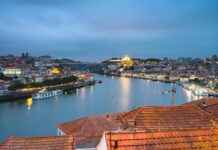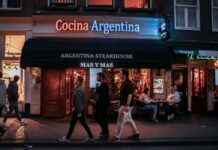«It is up to us to be better, more efficient,» said the French president on Tuesday on the first day of a tour of Cameroon, Benin and Guinea-Bissau, when the head of Russian diplomacy Sergei Lavrov is also visiting the African continent.
For him, France has no choice if it wants to continue to retain some influence on the continent, especially in its former «backyard» in Central Africa, where Cameroon occupies a prominent place.
But, for twenty years, «we have been jostled», «perhaps because we had fallen asleep», while China, India, Russia, Turkey or Germany led the offensive and took a large part of the market share.
Result: French companies, which number about 200, now only weigh about 10% of Cameroon’s economy against 40% in the 1990s.
As a result, the perception of France has become blurred. «The French decline is due to the fact that it no longer appears as an actor in the development of our country», notes Aude Yemelong, member of the Franco-Cameroonian youth council.
«France has a huge role to play in Cameroon, but without playing any», summarizes in a formula Claude Leroy, the former coach of the Indomitable Lions national team with which he became very popular. Coming among the presidential delegation, he recommends that Paris play «a role of synthesis and suggestion» with African countries.
On the political level, «France does not have to interfere, to dub anyone, to give lessons», underlined the Elysée before the interview between Emmanuel Macron and his counterpart Paul Biya who, at 89, is twice as old as the Frenchman and has ruled Cameroon with an iron fist for almost 40 years.
The choice to start his first African tour since his re-election with Cameroon has aroused strong criticism: researchers Ilaria Allegrozzi (Human Rights Watch) and Fabien Offner (Amnesty International) had deemed it «crucial», in Le Monde, that Mr. Macron expresses «clearly» to Mr. Biya «his concern» about «the repression against anyone in the country who dares to criticize the government».
Noting that France had so far relied too much «on politics and the military», Emmanuel Macron is now betting on civil society and youth, with whom he hears about culture, digital, sports, environment…
– Critics of Russia –
The ambition is also to settle the «unspoken» and the «misunderstandings» linked to colonization which «feed distrust» with France. He announced that a commission of historians would shed light on the action of France in Cameroon during colonization and after the independence of this country in 1960.
This memorial issue was considered essential, as a «work of justice», by the 11 members of the Franco-Cameroonian council, whom Emmanuel Macron was to meet in the evening in «the Noah village» created by the former tennis player Yannick Noah in Yaoundé .
The new French method is also being tested on the burning issue of the anti-jihadist fight, particularly in the Sahel, where Emmanuel Macron suffered disappointments, the army being forced to leave Mali after the junta came to power.
«We will not let go of the security of the African continent», however warned the president, reaffirming his desire to «reinvent» the «military and security system».
For him, France must «be there in an even more explicit way at the request of African States, with a clear and explicit request, by being more present on the subjects of training, equipment, by being in support of the African armies to helping them to build capacity and always linking our system with security, defence, diplomacy and development», he explained.
Faced with Paul Biya, who refused to explicitly condemn the invasion of Ukraine, Emmanuel Macron also strongly denounced the «hybrid presence» of Russia in Africa, which «passes through disinformation and militias», and which » is a concern first and foremost for the African continent».
Responding to him from a distance, the head of Russian diplomacy Sergei Lavrov, also on tour in Africa, assured that his country would «significantly increase» its role on the continent.
Emmanuel Macron is expected Wednesday in Benin then Thursday in Guinea-Bissau.













